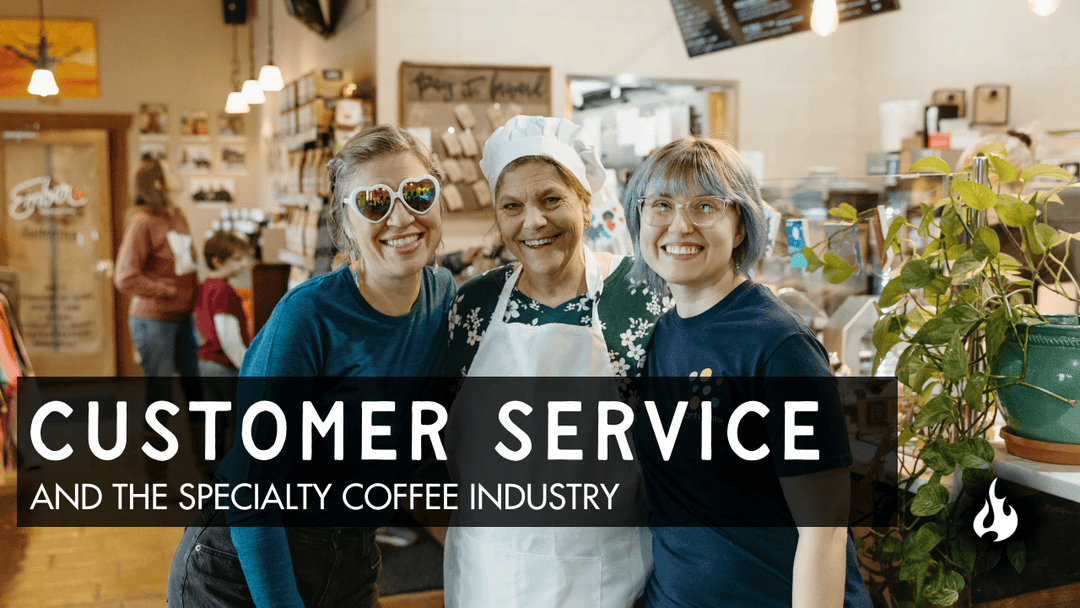Why Role Clarity Drives Coffee Shop Performance
Why do some coffee shops thrive while others struggle to keep their doors open?

Why do some coffee shops thrive while others struggle to keep their doors open?
Surprisingly, it’s not always about location, product quality, or pricing. While these factors certainly play a role, an often-overlooked yet critical element is clarity. Clear communication, well-defined roles, and structured workflows can make or break a coffee shop's ability to operate smoothly. Without clarity, even the best products and locations can’t overcome miscommunication and operational chaos. For coffee shop owners in Minnesota and beyond, role clarity isn’t just a nice-to-have—it’s a game-changer that can transform daily operations.
When staff understand their responsibilities and workflows are streamlined, efficiency skyrockets. Baristas aren’t tripping over each other behind the counter, orders are processed faster, and customers leave satisfied. This clarity also creates a better work environment, as employees feel confident in their roles and less stressed by confusion or overlap. Over time, these improvements lead to happier teams, loyal customers, and a stronger bottom line. By prioritizing role clarity, coffee shop owners can move beyond survival mode and create an exceptional experience for both employees and customers alike.

What’s Holding Back Small Coffee Businesses?
Running a coffee shop is no easy task. Picture the hustle of a busy morning rush—the line out the door, the hum of espresso machines, and the constant juggling of orders. Amid the energy, challenges like high operational costs and wasted labor can quickly eat into profits. A stretched-thin team without clear roles often leads to burnout, while delays and missed orders risk driving loyal customers to find their caffeine fix elsewhere.
As you dream of growing—maybe opening that second or third location—the hurdles multiply. Without clear systems in place, replicating success feels impossible. And as the owner, staying buried in daily tasks leaves little time to focus on the big picture.
For coffee shops—whether you serve local roasted coffee or a specialty grade coffee brand like Ember—it’s crucial to streamline operations to thrive in a competitive market. Customers seeking the best coffee in MN expect consistency, speed, and quality with every visit. These challenges are common, but with the right tools and systems, you can transform the chaos into a smooth, well-oiled machine. Could this overlooked solution be the key to your success??

Why Clarity Matters in Coffee Shop Operations
Clarity reduces inefficiencies, prevents burnout, and fosters accountability—allowing your business to run smoothly and your team to stay focused on what matters most.
The Ripple Effects of Unclear Roles:
- Double Work: Imagine two baristas cleaning the espresso machine at the same time while no one is refilling milk jugs or preparing to-go orders. Overlapping effort wastes valuable time and resources.
- Service Delays: When no one knows who’s responsible for restocking key items, supplies run out at the wrong time. This creates bottlenecks during rush hours.
- Employee Burnout: Without defined expectations, employees feel lost and overburdened. Frequent role ambiguity leads to dissatisfaction, disengagement, and turnover.
- Missed Accountability: If everyone assumes “someone else will do it,” critical tasks fall through the cracks.
The antidote? A Responsibility Matrix.
Meet the Responsibility Matrix
A Responsibility Matrix is a straightforward yet highly effective tool to clarify roles, eliminate confusion, boost efficiency, and empower teams to perform at their best. By clearly mapping out who handles what, it ensures everyone knows their responsibilities, promoting smoother operations and better teamwork.
How to Build an Effective Responsibility Matrix:
1. Identify Routine Tasks
Start by listing all the routine tasks that need to be completed on a regular basis. Be as detailed as possible to ensure nothing is overlooked. Common examples might include:
- Brewing and restocking coffee for staff and customers.
- Cleaning and maintaining equipment to keep operations running smoothly.
- Managing inventory to prevent shortages or overstocking.
- Providing excellent customer service during peak hours to enhance the overall experience.
Consider tasks specific to your team or organization and include them in your list. The goal is to ensure all necessary duties are accounted for.
2. Assign Primary Ownership
Assign a primary person responsible for each task. This person will take full ownership and ensure the task is completed consistently and effectively. Clear role assignments help eliminate uncertainty, allowing employees to work confidently and with a sense of accountability. When every team member knows exactly what they’re in charge of, the entire operation runs more smoothly.
3. Designate Backup Coverage
To maintain seamless operations, assign a backup person for every task. This ensures that if the primary owner is unavailable—due to illness, vacation, or another unforeseen circumstance—the task will still be handled without disruption. Backup coverage is especially critical for high-priority and time-sensitive tasks that can’t afford delays.
4. Review and Update Regularly
A Responsibility Matrix should not be static. As your team evolves or priorities shift, regularly review and update the matrix to reflect these changes. This ensures everyone stays aligned with current responsibilities and allows for adjustments as needed.
By following these steps, you can create a Responsibility Matrix that not only improves clarity and efficiency but also fosters a more cohesive and empowered team environment..
Example Responsibility Matrix:

Keep the matrix visible for quick reference and shared accountability. Update it regularly as team dynamics or operational needs evolve.
Case Study in Clarity: How Cat & Cloud Coffee Brews Success Through Role Clarity
At first glance, Cat & Cloud Coffee may seem like just another specialty coffee shop, but behind the counter, there’s a philosophy driving their success: role clarity. Co-founder Chris Baca believes that a thriving business starts with employees who truly understand their purpose. As he puts it, "We believe people want to do meaningful work. But to do that, they need to understand why their work matters."
For Cat & Cloud, this meant taking a step back and reevaluating how their team viewed their roles. Instead of seeing daily tasks as just checking off boxes, they focused on helping employees see the bigger picture—how their work directly contributed to the company’s mission and success. Baristas weren’t just making lattes; they were creating moments, building relationships, and representing the brand’s values with every customer interaction. This shift empowered team members to take pride in their roles, transforming ordinary jobs into fulfilling careers.
The results were remarkable. Employees became more engaged and motivated, which translated into an energized workplace and exceptional customer service. Customers noticed the difference too—interactions felt more genuine, service became more memorable, and Cat & Cloud’s reputation flourished. Team morale soared as employees felt valued and connected to a greater purpose.
What’s even more inspiring is that this approach isn’t exclusive to coffee shops. Any business, regardless of industry, can benefit from focusing on role clarity. By helping employees understand how their work aligns with broader goals, companies can unlock higher levels of engagement, loyalty, and performance.
Cat & Cloud’s story is a testament to the power of clarity—not just in communication but in the way businesses operate. It’s proof that when people know why their work matters, they’re not just employees—they’re invested contributors to something bigger..
Unlock the Power of Role Clarity
Establishing clear roles and structured operations can transform your business, offering significant advantages:
1. Boost Team Efficiency
When tasks are clearly defined and assigned, your team knows exactly what is expected of them. This eliminates confusion, reduces downtime, and keeps everyone focused on their responsibilities. Teams can collaborate more effectively, ensuring smoother workflows and better overall productivity.
2. Ensure Consistency Across All Locations
Having defined processes and procedures guarantees a uniform experience for your customers, regardless of where they engage with your business. This is especially important if you’re scaling operations or managing multiple locations. Consistency builds customer trust and loyalty, setting a solid foundation for growth.
3. Enhance Employee Morale and Engagement
When employees clearly understand their roles and responsibilities, they feel valued and empowered. This clarity fosters confidence, reduces workplace stress, and helps your team work with greater purpose. As a result, job satisfaction increases, leading to lower turnover and a more committed workforce.
4. Establish Accountability at Every Level
Role clarity eliminates guesswork, ensuring that every team member knows their duties and who they report to. This transparency promotes a culture of accountability, where everyone takes ownership of their work. By reducing miscommunication and errors, you create a more proactive and frustration-free environment.
Investing in role clarity not only optimizes day-to-day operations but also creates a stronger, more cohesive team prepared to drive your business forward..
Best Practices for Implementing Clarity
What to Do:
- Start Small: Begin with the key pain points, such as inventory checks or opening/closing duties.
- Celebrate Contributions: Show employees how their work supports the whole operation to foster a sense of purpose.
- Iterate as You Grow: Businesses evolve, so regularly update roles and responsibilities.
What to Avoid:
- Micromanaging: Set clear expectations but trust your team to execute. Empowerment, not control, is the goal.
- Excessive Complexity: Don’t overcomplicate your SOPs. Simple, actionable instructions are far more effective.
- Neglecting Input: Collaborate with employees when creating or modifying their roles to ensure a smoother adoption.

Remove the Chaos. Add the Clarity.
Your coffee shop’s success isn’t about working harder; it’s about working smarter. By fostering clarity, you empower your team, improve operations, and build an environment where employees and customers thrive.
Are you ready to transform your coffee shop? Contact us today for a free coaching session. Together, we’ll take your café from chaos to clarity, one cup at a time.







